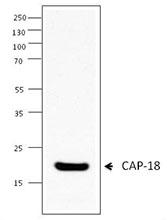Cathelicidin (CAMP) Mouse Monoclonal Antibody [Clone ID: H7]
Frequently bought together (3)
beta Actin Mouse Monoclonal Antibody, Clone OTI1, Loading Control
USD 200.00
Other products for "Cathelicidin"
Specifications
| Product Data | |
| Clone Name | H7 |
| Applications | WB |
| Recommended Dilution | WB, IF, IP, Fc |
| Reactivities | Human |
| Host | Mouse |
| Isotype | IgG1 |
| Clonality | Monoclonal |
| Immunogen | Partially purified human neutrophil membrane proteins, with epitope mapping to amino acids 115-121 |
| Formulation | This antibody is provided in phosphate-buffered solution, pH 7.2, 0.09% NaN3. |
| Concentration | lot specific |
| Purification | The antibody was purified by affinity chromatography. |
| Conjugation | Unconjugated |
| Storage | Store at -20°C as received. |
| Stability | Stable for 12 months from date of receipt. |
| Predicted Protein Size | 19.3 kD |
| Gene Name | cathelicidin antimicrobial peptide |
| Database Link | |
| Background | Antimicrobial peptides (AMP) are effector molecules of the innate immune system with direct antimicrobioal and immunomodulatory effects. AMP are produced by epithelial and professional host defense cells such as macrophages or neutrophils. AMP directly inactivate microorganisms and, in addition, have diverse activities on various cell types. In mammals, peptides of the defensin and the cathelicidin families are found. hCAP-18 is the only cathelicidin present in humans. hCAP-18 is a 170 amino acid cathelicidin anti-microbial precursor protein that is proteolytically processed to yield the antibacterial peptide LL-37. The precursor hCAP-18 is found in the specific granules of neutrophils and is expressed in many immune and epithelial cells. Cathelicidin has an established role in host defense. In addition to their direct antimicrobial function, cathelicidin peptides are involved in the modulation of repair and tissue homeostasis, epithelial wound healing, chemoattraction of immune cells, and release of inflammatory mediators from epithelial cells. Recent studies also found that LL-37 significantly regulates endocytic capacity, modifies expression of phagocytic receptors, increases secretion of Th1-inducing cytokines of dendritic cells (DC) generated from blood monocytes, and modulates the response of monocytes and DC to toll like receptor (TLR)–ligands. Moreover LL-37 also modulates the response of neutrophils to bacterial activation. |
| Synonyms | CAP-18; CAP18; CRAMP; FALL-39; FALL39; HSD26; LL37 |
| Reference Data | |
| Protein Families | Secreted Protein, Transmembrane |
Documents
| Product Manuals |
| FAQs |
| SDS |
{0} Product Review(s)
0 Product Review(s)
Submit review
Be the first one to submit a review
Product Citations
*Delivery time may vary from web posted schedule. Occasional delays may occur due to unforeseen
complexities in the preparation of your product. International customers may expect an additional 1-2 weeks
in shipping.






























































































































































































































































 Germany
Germany
 Japan
Japan
 United Kingdom
United Kingdom
 China
China



